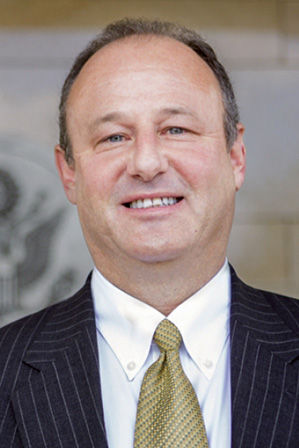Back to the Spoils System?
President’s Views
BY ERIC RUBIN

In his superb article in the January-February FSJ, Ambassador Dennis Jett tracks the history of efforts to professionalize the U.S. Civil Service and U.S. Foreign Service and to insulate both from partisan pressure, corruption, and venal influences.
He salutes the legacy of Presidents Teddy Roosevelt, William Taft, and Grover Cleveland in working to remedy the sordid situation that cost President James Garfield his life. (Garfield was killed by a patronage seeker in 1881.)
Amb. Jett also reminds us of the huge steps forward that came in the form of the 1924 Rogers Act, which created the U.S. Foreign Service, and the 1946 and 1980 acts, which updated it and gave our career service its present shape and structure.
The fact that some elected representatives talk about re-creating former President Donald Trump’s ill-fated “Schedule F”—designed to remove protections for certain government employees and allow for even more political hiring—is deeply worrying.
As disturbing are efforts in the House of Representatives to revive the so-called Holman Rule that would allow amendments to appropriations legislation to reduce the salary of, or to fire, specific federal employees at will. This raises serious questions about the separation of powers as well as political interference.
I have been privileged to work with many talented political appointees during 38 years in the Foreign Service. Most came to appreciate the value of a professional, experienced, and nonpartisan career service that assisted in carrying out the policies of the president who appointed them.
Many went on to become champions of the Foreign Service in Congress, such as Senators Dan Sullivan (R-Alaska) and Bill Hagerty (R-Tenn.), and Representatives Ann Wagner (R-Mo.) and Andy Kim (D-N.J.). Many others have become ambassadors and senior administration officials after their service in Congress.
Many of us have also known or worked with political appointees who made clear their disdain for and mistrust of the Foreign Service, the Civil Service, and career federal employees in general. Unfortunately, a small number of Secretaries of State and USAID Administrators can be counted in that category.
Sometimes the reasons are ideological, and other times pragmatic: Insecure political appointees may see experienced, knowledgeable, and nonpartisan career employees as a hindrance to carrying out policies and plans that may run afoul of federal law and regulations.
We saw that in ample measure in the investigation of what happened in Ukraine during the first impeachment process against former President Trump. (We also saw that the best defense against corruption in the federal government is transparency, which includes strong Inspectors General, whistleblower protections, and protections against retaliation. “Because I say so” is never the right answer in our government.)
And then there are the few political leaders who don’t appreciate counsel from professional experts whose standing and confidence come from extended, successful careers in the federal service and its century-long job protections.
I continue to believe in the role that America can play in promoting the values that we like to say our country stands for: democracy, human rights, transparency and anti-corruption, and peaceful transfer of power. Like many of you, I have worked on these issues across the world.
But if we abandon the critical lessons of the past century and return to the days when federal jobs were for sale to the highest bidder or top political crony, and when federal employees felt intimidated from following their oath to the U.S. Constitution for fear of losing their livelihoods or worse, we will cease to be a model for any part of the world.
AFSA is and must remain strictly nonpartisan and apolitical. We do not endorse or oppose candidates, and we refrain from taking positions on policy issues and decisions.
But when it comes to defending the principle and practice of having the federal government staffed by career professionals who work for the American people and follow the Constitution as required by their oath of office, we stand firm.
No to politicization. No to bringing back the spoils system and cronyism. No to destroying the structures and rules that make us a nation worthy of emulation.
When sharing or linking to FSJ articles online, which we welcome and encourage, please be sure to cite the magazine (The Foreign Service Journal) and the month and year of publication. Please check the permissions page for further details.
Read More...
- “Psst! Hey, Buddy, Wanna Buy an Ambassadorship?” by Dennis Jett, The Foreign Service Journal, November 2012
- “Schedule F(SL)—Noncareer Hiring Takes a Toll” by Jason Singer, The Foreign Service Journal, April 2021
- “Schedule F: Let’s Deprofessionalize Government and Make America Irrelevant Again” by Dennis Jett, The Foreign Service Journal, January-February 2023

